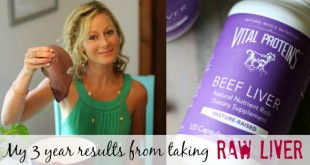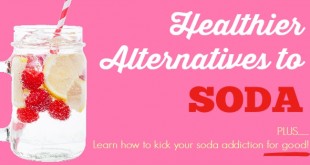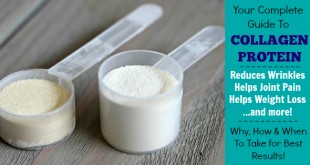
There is way too much nonsense going around in nutrition.
People don’t seem to agree on anything and trying to make sense of it can be overwhelming.
However… eating healthy does NOT have to be complicated if you keep a few things in mind.
Here are 15 things that everyone needs to know about nutrition.
1. Meat Does Not Rot in Your Colon
One of the most ridiculous myths about meat, is that it rots in your colon.
This is absolute nonsense, kept alive by people who want to scare others away from eating meat.
The truth is that meat gets broken down by stomach acid and enzymes, then absorbed, mostly as amino acids and fatty acids.
The human digestive system is well equipped for meat consumption and our bodies make full use of the proteins, fats, vitamins and minerals found in meat.
If you want to know what really rots in your colon, then it is indigestible plant matter, also known as fiber.
This is actually a good thing… the friendly bacteria in the intestine digest the fiber and turn it into short-chain fatty acids that have important benefits for health (1).
2. Everywhere The Western Diet Goes, Diseases Follow

Most chronic, Western diseases are relatively new.
They appeared recently in evolutionary history and populations that don’t eatprocessed foods don’t get them.
The truth is… everywhere the Western junk food diet goes, chronic diseases follow.
This was well documented by researchers (including the legendary Weston A. Price) in the earlier parts of the 20th century, when many populations were on the brink of Western influence.
When these populations abandoned their traditional diet in favor of modern “luxuries” like sugar, refined flour and processed oils, they got sick.
They got fat, their teeth started to rot, they became diabetic and started dying from heart disease and cancer. It happened within a few years.
These diseases are often referred to as the “diseases of civilization” – which are currently the biggest health problems in the world.
Most of them are exacerbated or downright caused by the modern diet.
3. Most “Studies” Reported by The Media Are Absolute Nonsense
The way nutrition studies are reported in the media is a disgrace.

These studies are often taken completely out of context and weak studies are made to seem like they prove something.
Usually, these studies are observational studies, which can not prove anything.
Such studies can only show a statistical correlation and give researchers ideas for something to test in randomized controlled trials.
Unfortunately, this leads many people to make important health decisions based on bad and misleading science.
4. Refined and Processed Oils Are Extremely Unhealthy

Processed seed- and vegetable oils like soybean and canola oils are often mistakenly assumed to be healthy.
This is a huge mistake. These oils weren’t available to humans until a hundred years ago, because the technology to process them wasn’t available.
Their fatty acid composition is completely different than anything we were ever exposed to throughout evolution, being very high in Omega-6 fatty acids, which can cause problems when consumed in excess (2, 3).
These oils are also loaded with trans fats… which are highly toxic and strongly associated with metabolic problems and heart disease (4, 5).
It is best to eat healthy, natural fats like coconut oil, butter and extra virgin olive oil, but to avoid processed seed- and vegetable oils like the plague.
5. “Natural” Doesn’t Necessarily Mean “Healthy”

It is a mistake to assume that everything that is natural is healthy.
True… it is a very good rule of thumb to choose natural foods instead of processed.
But there are many examples of so-called natural foods being just as harmful as their processed counterparts… if not worse.
One example of that is a “natural” syrup called Agave nectar.
This syrup used to be very popular in the natural health community and found its way into all sorts of “health foods.”
However, when looking at the nutrient composition, it contains even more fructose than plain old sugar and high fructose corn syrup.
Fructose is the most unhealthy part of sugar and agave is loaded with it, making it even unhealthier than regular sugar.. and that’s saying something.
6. Fat Doesn’t Make You Fat

It seems intuitive that eating fat would make you fat.
After all, the stuff that lodges under our skin and makes us soft and puffy, is fat. So, eating more fat should make us store more of it.
Fat also has more calories per gram than protein and carbs, another reason some people believe fat to be inherently fattening.
But the body is much more complicated than that and this depends entirely on the context.
Many studies show that diets that are high in fat (but low in carbs) actually lead to more weight loss than diets that are low in fat but high in carbs (6, 7, 8).
7. Carbs Don’t Make You Fat
Many low-carbers believe that carbs are inherently fattening, but this is false.

Even though removing carbs can (in many cases) reverse obesity, it doesn’t mean that “carbs” per se caused the problem in the first place.
There are many examples of populations that ate a very high-carb diet (with real foods) and didn’t have obesity or other chronic, Western diseases.
This includes the Okinawans and Kitavans, as well as Asian populations that ate a lot of rice.
If you’re just a healthy person trying to stay healthy, then a low-carb diet may be completely unnecessary. Just stick to unprocessed carb sources that include fiber.
The prevention doesn’t need to be the same as the cure.
8. Protein is The Most Important Macronutrient to Lose Weight

When it comes to losing weight, protein is the king of nutrients.
Numerous studies show that it can boost metabolism (calories out) and reduce appetite (calories in).
A high protein diet can increase the amount of calories you burn by 80 to 100 calories per day, because protein requires energy to be metabolized (9, 10, 11).
There is also a study showing that eating 30% of calories as protein made people automatically eat 441 fewer calories per day and lose 11 pounds in 12 weeks, just byadding protein to their diet (12).
If you keep protein high, then you should automatically tilt the energy balance equation in your favour and make it easier to lose weight over the long term.
9. Sugar is a Disaster… and Sugar-Sweetened Beverages Are The Worst

The harmful effects of sugar go way beyond empty calories.
It is now known that due to the large amount of fructose, sugar can lead to all sorts of metabolic problems and is strongly associated with the risk of chronic disease (13).
Sugar is bad, but consuming it in liquid form is even worse.
Liquid sugar calories don’t get registered by the brain in the same way as solid sugar calories, so the brain doesn’t compensate by eating less of other foods (14).
If anything, sugar-sweetened beverages are the single most fattening and disease promoting aspect of the modern diet.
One study shows that the risk of obesity in children is increased by 60% for each single daily serving of a sugar-sweetened beverage (15).
Unfortunately, fruit juice isn’t much better. It is very similar to a sugar-sweetened beverage and the small amounts of vitamins do NOT make up for the large amounts of sugar.
10. The Best Diet (or “Way of Eating”) For YOU is The One You Can Stick to

The “right” diet for an individual depends on numerous things.
This includes age, gender, activity levels, metabolic health, food culture and personal preference.
It is a huge mistake to assume that there is such a thing as an optimal diet for everyone.
Of course, there are some diets that work best for certain health problems… a low-carb diet for diabetics, for example.
However, if you simply want to lose (or maintain) weight and prevent disease, perhaps the single most important factor is finding something that you can stick to in the long run.
This is ultimately the key determinant of long-term success… finding something that you like and can stick to for life. Losing weight is a marathon, not a sprint.
11. Dietary Cholesterol and Saturated Fat Are Not Harmful

In the past, dietary cholesterol and saturated fat were demonized.
However… new massive studies have shown that there really is no link to heart disease. It was a myth all along (16, 17, 18, 19).
Studies on the low-fat diet still recommended all around the world show that it is 100% useless. It does not lead to long term weight loss or prevent heart disease or cancer (20, 21, 22).
It is time to retire the low-fat fad.
12. Never Trust What Manufacturers Put on The Label

Unfortunately, food manufacturers aren’t very honest about the true health effects of their foods.
They often put misleading health claims on the packaging, deceiving people into thinking that their products are healthy.
This includes “whole grain” labels on sugary breakfast cereals and low-fat labels on yogurts.
Usually these foods are loaded with sugar, or they really don’t contain what they’re claimed to.
In any case, small amounts of a healthy ingredient do NOT make up for large amounts of unhealthy ingredients like sugar or refined seed oils.
Keep this golden rule in mind… if the packaging of a food tells you that it is healthy, then it probably isn’t.
13. Calories Count, But You Don’t Necessarily Need to Count Them to Succeed

Some people say that all that matters when it comes to losing weight, is calories in and calories out.
It is true that in order to lose weight, more energy (calories) needs to be leaving the body than entering it.
This is dictated by an unbreakable law of physics called the First Law of Thermodynamics.
However… the human body is an immensely complex metabolic machine and there are many complex factors at play.
There are many things you can do to achieve negative energy balance, without ever counting a single calorie.
This includes cutting carbs, eating more protein and/or simply abandoning processed foods in favour of real, unprocessed foods.
Calories count, that is a scientific fact. But that doesn’t mean that counting them is necessary.
14. If it’s Labelled “No Fat” or “Low-Fat” Then it’s Probably Bad For You

When researchers and the media started demonizing fat, all sorts of processed foods were put on the market.
The problem is, natural foods taste horrible when the fat has been removed from them.
The food manufacturers were well aware of this problem, so they added a whole bunch of sugar and artificial chemicals to make up for the lack of fat.
Most low-fat foods have had the fat removed, only to be replaced with something much, much worse.
15. Real Food is The Key to Good Health, Processed Junk Food is Not
Even though nutrition can be extremely complicated, eating healthy is simple.
The most important thing is to stick to whole, unprocessed foods that resemble what they looked like in nature.
If the ingredients list has more than 5 items, or chemical sounding names that you don’t understand, then it’s probably bad for you.
Keep in mind that real food doesn’t even need an ingredients list, because real food IS the ingredient.
Pin this nutrition advice HERE:
This article was written by Kris Gunners from Authority Nutrition and republished with permission.
 Primally Inspired Real food, Natural Remedies, Holistic Living
Primally Inspired Real food, Natural Remedies, Holistic Living











Great article and points! I wish I would have known many of these things years ago and it saddens me that it took me 33 years to truly learn what’s good for my body. Hopefully these things become more and more well known as people start to pay more attention to what’s really good for them. Not what society says is 🙂
I so wish I would have known these things years ago, too!!
Great article. You really hit the nail on the head with a lot of things here.
I’d like to add a couple of details to the protein section. There’s something called the Protein Digestibility Corrected Amino Acid Scores (PDCAAS for short). A quick google search of it will bring you to the wikipedia page. It highlights how well different types of protein-rich foods are digested by the human body. So making sure you get some quality proteins that are easily digested is key. Take it one step further, and make sure that they have a complete amino acid score (I use nutritiondata.self.com for that one), and you’re golden!
It’s quite a bit to take in at first, but putting it all together happens in no time. You’ll truly be getting the most bang for your buck then.
Thank you, Jason! That’s awesome info and very helpful!